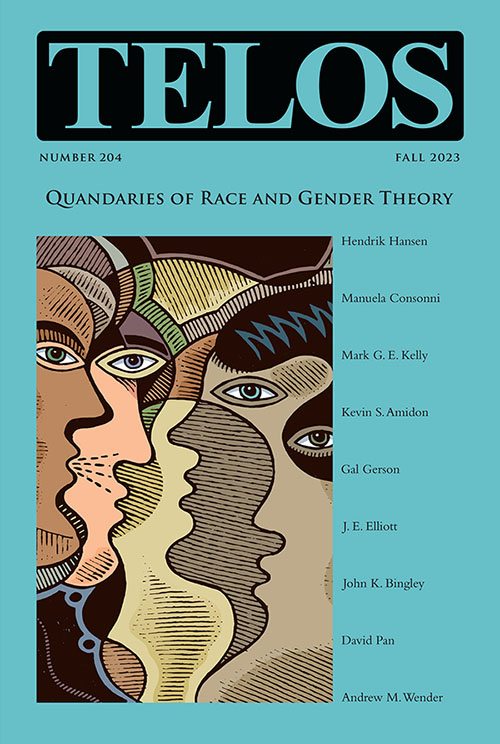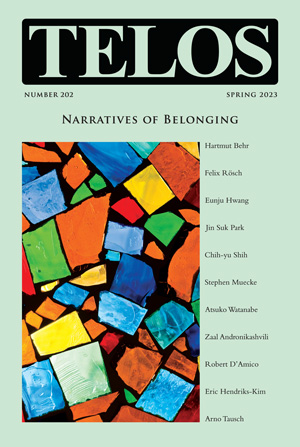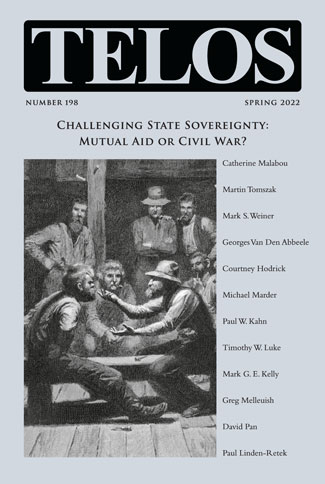By David Pan · Wednesday, October 18, 2023 Telos 204 (Fall 2023): Quandaries of Race and Gender Theory is now available for purchase in our store. Individual subscriptions to Telos are also available in both print and online formats.
 Old-style leftists have puzzled over how today’s left-liberals have abandoned traditional left-wing goals such as reducing class inequality and improving working-class standards of living. A key reason lies with the shifting of the politics of class. As Paul Piccone and Fred Siegel argued over thirty years ago in these pages, the problem of class is no longer a question of capitalists against workers. According to a recent Gallup poll, 61 percent of U.S. adults own stock, and such capitalist ownership, while a good way to increase wealth, is no longer the preserve of the ruling class and does not by itself confer much power. Rather, the ruling class that exercises real power consists not of owners but primarily of a bureaucratic class of managers in corporations, government, non-profits, universities, and the media. In spite of this shift, theories developed over a century ago continue to shape current leftist perspectives. Dominated by a socialist perspective, left-wing social policy fails to recognize and address the new contours of class division. As a result, it continues to employ a framework that is based on an anti-capitalist and anti-market agenda that tries to manipulate outcomes to promote socialist goals, precisely the methods of a managerial class. Old-style leftists have puzzled over how today’s left-liberals have abandoned traditional left-wing goals such as reducing class inequality and improving working-class standards of living. A key reason lies with the shifting of the politics of class. As Paul Piccone and Fred Siegel argued over thirty years ago in these pages, the problem of class is no longer a question of capitalists against workers. According to a recent Gallup poll, 61 percent of U.S. adults own stock, and such capitalist ownership, while a good way to increase wealth, is no longer the preserve of the ruling class and does not by itself confer much power. Rather, the ruling class that exercises real power consists not of owners but primarily of a bureaucratic class of managers in corporations, government, non-profits, universities, and the media. In spite of this shift, theories developed over a century ago continue to shape current leftist perspectives. Dominated by a socialist perspective, left-wing social policy fails to recognize and address the new contours of class division. As a result, it continues to employ a framework that is based on an anti-capitalist and anti-market agenda that tries to manipulate outcomes to promote socialist goals, precisely the methods of a managerial class.
Continue reading →
By Telos Press · Wednesday, April 12, 2023 Telos 202 (Spring 2023): Narratives of Belonging is now available for purchase in our store. Individual subscriptions to Telos are also available in both print and online formats. Online subscribers have access to the full issue at the Telos Online website. The following is an excerpt from the issue’s introduction by Hartmut Behr and Felix Rösch, who are the issue’s guest editors.
Introduction: Narratives of Belonging—The Interrelation between Ontological-Epistemological Observations and Narrative Methodology
Hartmut Behr and Felix Rösch
1. Introduction
 In a recent editorial, the Lancet reported that one of the consequences of pandemics is the detrimental impact “on the mental health of affected populations,” and the current COVID-19 one is no different. Since its outbreak at the end of 2019, “depressed mood, anxiety, impaired memory, and insomnia” are constant companions of people around the world. Many even experience “stress, burnout, depression, and post-traumatic stress disorder.” Amongst its concerns, the Lancet notes the rising “misuse of substances” as a consequence of these mental health problems.[1] One of the reasons for this global mental health crisis is the way the pandemic affects peoples’ practices of community building and rituals of belonging. Having to wear masks, being required to keep at least 1.5 meters apart, not being able to meet (vulnerable) friends and family members, and even more drastic measures like weeklong lockdowns fundamentally disrupted everyday lives and reduced opportunities to socialize. What is normally taken for granted is being challenged. Around the world, these measures have been met by increasing demonstrations, often based on conspiracy theories and against commonsense precautions for preventing a potentially lethal disease. This conflict between reasonable precaution and emotional stress and pressure suggests disruptions of common narratives of belonging. In a recent editorial, the Lancet reported that one of the consequences of pandemics is the detrimental impact “on the mental health of affected populations,” and the current COVID-19 one is no different. Since its outbreak at the end of 2019, “depressed mood, anxiety, impaired memory, and insomnia” are constant companions of people around the world. Many even experience “stress, burnout, depression, and post-traumatic stress disorder.” Amongst its concerns, the Lancet notes the rising “misuse of substances” as a consequence of these mental health problems.[1] One of the reasons for this global mental health crisis is the way the pandemic affects peoples’ practices of community building and rituals of belonging. Having to wear masks, being required to keep at least 1.5 meters apart, not being able to meet (vulnerable) friends and family members, and even more drastic measures like weeklong lockdowns fundamentally disrupted everyday lives and reduced opportunities to socialize. What is normally taken for granted is being challenged. Around the world, these measures have been met by increasing demonstrations, often based on conspiracy theories and against commonsense precautions for preventing a potentially lethal disease. This conflict between reasonable precaution and emotional stress and pressure suggests disruptions of common narratives of belonging.
Continue reading →
By Telos Press · Monday, August 22, 2022 In today’s episode of the Telos Press Podcast, David Pan talks with Ban Wang about his article “The Clash of Civilization and World Community: The West and China,” from Telos 199 (Summer 2022). An excerpt of the article appears here. In their conversation they discuss whether it still makes sense to speak of distinct human cultures; if the very ideas of China and the West need to be discarded, or, if not, what the basis of such distinctions would be and why they persist; whether there is a human commonality that lies below and beyond age-old cultural norms, and if so what is its content and what forms does it take; how both Chinese and Western forms of universalism have converged to form a cosmopolitan unity; how multiculturalism and identity politics have undermined cross-cultural interaction and a universalist vision; and what alternatives there are for affirming both universalism and local culture. If your university has an online subscription to Telos, you can read the full article at the Telos Online website. For non-subscribers, learn how your university can begin a subscription to Telos at our library recommendation page. Print copies of Telos 199 are available for purchase in our online store.
Continue reading →
By Telos Press · Monday, April 25, 2022 The Telos Student Seminars provide a forum for students around the world to engage with critical theory by discussing a common set of paired texts from Telos—one current essay and one pertinent essay from our archives. In our second cycle of seminars, we are discussing Huimin Jin’s “Cultural Self-Confidence and Constellated Community: An Extended Discussion of Some Speeches by Xi Jinping” (Telos 195, Summer 2021) and an excerpt from Cornelius Castoriadis’s “The Crisis of Western Societies” (Telos 53, Fall 1982). The following reports are from the Telos Student Seminars groups in Budapest, Hungary, and Nanjing, China. For more details about the Telos Student Seminars, including summaries of the two essays under discussion, click here.
Continue reading →
By David Pan · Wednesday, March 16, 2022 Telos 198 (Spring 2022): Challenging State Sovereignty: Mutual Aid or Civil War? is now available for purchase in our store. Individual subscriptions to Telos are also available in both print and online formats.
 State sovereignty has a complicated relationship to individual rights. They are clearly in opposition, and both left-wing anarchist and right-wing libertarian critiques of the state have attempted to defend individual freedoms against the power of the state. Yet more traditional liberals and conservatives often see the state as the guarantor of individual rights, the left looking to the state as a provider of welfare services to the disadvantaged, and neoconservatives defending state power as the guarantor of individual rights against foreign aggressors as well as domestic enemies. These four different approaches map out a political landscape that is divided not just into left–right but also into pro- and anti-state tendencies. State sovereignty has a complicated relationship to individual rights. They are clearly in opposition, and both left-wing anarchist and right-wing libertarian critiques of the state have attempted to defend individual freedoms against the power of the state. Yet more traditional liberals and conservatives often see the state as the guarantor of individual rights, the left looking to the state as a provider of welfare services to the disadvantaged, and neoconservatives defending state power as the guarantor of individual rights against foreign aggressors as well as domestic enemies. These four different approaches map out a political landscape that is divided not just into left–right but also into pro- and anti-state tendencies.
In spite of this fragmentation, though, there are two main concerns that are shared. In the first place, there seems to be a general recognition among these different perspectives that the inhabitants of a state are not completely homogeneous and that the internal heterogeneity of a state should be at least in part the basis for domestic order. If libertarians prefer market-based structures and traditional conservatives look to family and religion, liberals seem to have gravitated toward identity-based groupings, and anarchists might prefer mutual aid organizations as independent places of sovereignty within which individuals can define themselves. The disagreements concern the type of heterogeneity that is being called for as well as the precise mechanisms for supporting diverse organizations within the state.
Continue reading →
By Wolfgang Thierse · Friday, March 12, 2021 The following essay was originally published in the Frankfurter Allgemeine Zeitung on February 22, 2021, and appears here in translation with permission of the author. Translated by Russell A. Berman, with comments here.
To read more in depth from Telos, subscribe to the journal here.
Community membership used to be a matter of religion and, after that, ideology. Today this function has been taken over by the concept of identity. Religion and ideology in the past led repeatedly to serious and even bloody conflicts. Will this history repeat itself under the new principle? Themes of cultural membership seem to be rattling our Western societies increasingly, splitting them along the political lines of distributive justice. Questions of identity—ethnic, gender, sexual—dominate, as the debates over racism, postcolonialism, and gender grow violent and aggressive. These are probably unavoidable confrontations in an increasingly pluralistic society, just as they give expression to social conflicts, fought over the distribution of visibility and influence, attention and recognition.
As unavoidable as these conflicts may seem, they are also confusing, opaque, and ambivalent. The violence of some attacks against traditionalist positions, as well as the violence in the defense of tradition, in addition to the radicalness of identity demands lead to the question: How much identity politics strengthens the pluralism of a society, and at what point does it turn into fragmentation? The principle at stake is this: the ethnic, cultural, and religious-worldview pluralism that is growing in Germany as elsewhere is no idyll; on the contrary it is full of disputes and conflict potential. If this multifacetedness is to be lived out in a peaceful manner, then pluralism must be more than the mere coexistence of minorities and identities that not only differ from each other but also separate from each other. Fundamental commonalities are necessary, including of course a common language, and naturally also a shared recognition of justice and law.
Continue reading →
|
|
 Old-style leftists have puzzled over how today’s left-liberals have abandoned traditional left-wing goals such as reducing class inequality and improving working-class standards of living. A key reason lies with the shifting of the politics of class. As Paul Piccone and Fred Siegel argued over thirty years ago in these pages, the problem of class is no longer a question of capitalists against workers. According to a recent Gallup poll, 61 percent of U.S. adults own stock, and such capitalist ownership, while a good way to increase wealth, is no longer the preserve of the ruling class and does not by itself confer much power. Rather, the ruling class that exercises real power consists not of owners but primarily of a bureaucratic class of managers in corporations, government, non-profits, universities, and the media. In spite of this shift, theories developed over a century ago continue to shape current leftist perspectives. Dominated by a socialist perspective, left-wing social policy fails to recognize and address the new contours of class division. As a result, it continues to employ a framework that is based on an anti-capitalist and anti-market agenda that tries to manipulate outcomes to promote socialist goals, precisely the methods of a managerial class.
Old-style leftists have puzzled over how today’s left-liberals have abandoned traditional left-wing goals such as reducing class inequality and improving working-class standards of living. A key reason lies with the shifting of the politics of class. As Paul Piccone and Fred Siegel argued over thirty years ago in these pages, the problem of class is no longer a question of capitalists against workers. According to a recent Gallup poll, 61 percent of U.S. adults own stock, and such capitalist ownership, while a good way to increase wealth, is no longer the preserve of the ruling class and does not by itself confer much power. Rather, the ruling class that exercises real power consists not of owners but primarily of a bureaucratic class of managers in corporations, government, non-profits, universities, and the media. In spite of this shift, theories developed over a century ago continue to shape current leftist perspectives. Dominated by a socialist perspective, left-wing social policy fails to recognize and address the new contours of class division. As a result, it continues to employ a framework that is based on an anti-capitalist and anti-market agenda that tries to manipulate outcomes to promote socialist goals, precisely the methods of a managerial class. 








